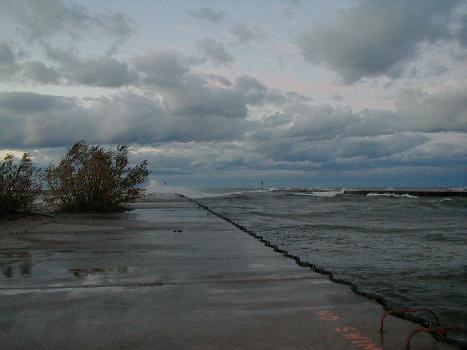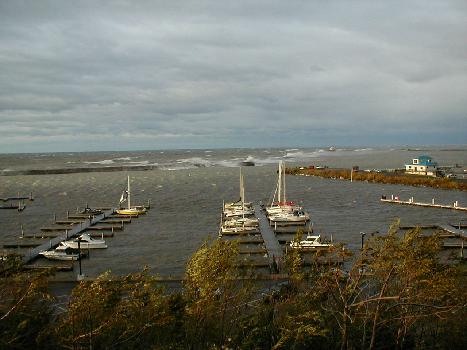October's
changeable weather on Lake Ontario
On
October 2 a mild and sunny morning, we heard thunder rumbling out over the
lake. We took a hike to the lakeshore to see what sort of weather event was
underway. Standing in bright sunshine under a blue sky and surrounded by lush
greenery we saw over the water a bank of lofty lake effect cumulous. A series
of dark little rainsqualls marched along off shore under the cloud line and as
we watched several lightning strikes flashed down from one particularly dark
spot under the cloud line and more thunder boomed. A brisk southwest wind had ruffled the lake and we could see the
big rollers on the horizon flashing their whitecaps against the dark sky.

a panoramic view of the early October lake squall
As
we gazed upon all this, one distant smudgy
gray spot of mist darkened and changed
shape and intensified slightly. Waterspout. Above it a thin dark gray line
angled down from the cloud bottom reaching about half way to the water and the
dark smudge there. After a few seconds it shortened and disappeared. A few hours later, the clouds moved inland
and pelted us with frozen water that whitened the golf course greens a couple
miles inland but that came down as rain on shore beside the still 54 degree
lake waters.
On
October 11, we took Titania out for a last lingering dawdle on the
lake under a warm sun and with gentle
breezes. We sailed slowly over calm water and were able to clearly make out the
bottom of the lake in 41 feet of water. Two days later the yacht was on the
hard for the winter. And a couple days after
that a storm blew through.
Full
fledged storms are rare this early in the fall on Lake Ontario. They usually
wait until November to sweep across its waters bringing lake effect snow with
them. But this one came in on the morning of Oct 15 and by mid morning winds
were exceeding the official definition of storm ( 48 knots) as monitored via
the internet on the buoys moored out in the lake. Later that morning the buoy
indicator got stuck at 54 knots for three hours so it probably missed the peak
winds. A professor at SUNY Oswego told me that the meteorology department wind
instrument atop their classroom building registered a gust of 85 miles an hour.

The
lake looked downright savage- there were fifteen-foot waves offshore and fifty
mile an hour winds near shore. Spume and spindrift blew off the dirty brown
waves even within protected bays and harbors. The east end of the lake's water
level was predicted to rise two feet due to wind surge.
Boats
broke off moorings and sank; furling jibs became unfurled and shredded in short
order. And a man rowing a dinghy was reported blown across Sodus Bay and rescued
from Eagle Island. Dozens of yachts waiting haul out at the dock suffered minor
damage and the next day a sand drift over a foot high surrounded the hot dog
stand at Sodus Point. It was a wild
day.

The
lake is increasingly empty now of pleasure boat traffic. Once again it becomes the
realm of bufflehead and merganser, gull and eagle.